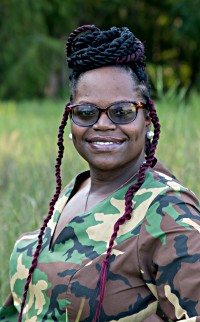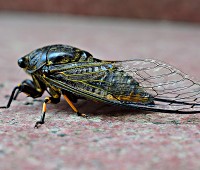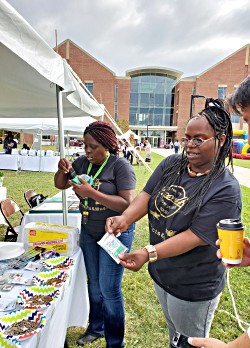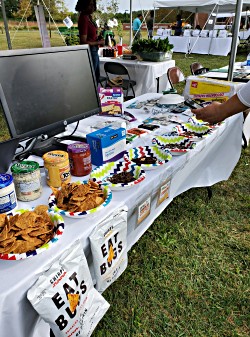
UMES’ resident expert on 17-year cicadas, Ebony Jenkins, has met with recent acclaim. The food and agricultural sciences doctoral student has been called on to share her fascination with and knowledge of the curious insect to local media and community groups. She, however, adds a quirky and interesting angle to the story—not the insect’s entomology, but its edibility.
Jenkins’ research is agricultural entomophagy, rearing insects for human consumption, feed and biological controls. She and her research advisor, Dr. Simon Zebelo, an associate professor of entomology and plant biology, tout the insect among others as a potentially safe, economical and nutritious source of protein.
“Over two million people in the world currently consume insects as a protein source,” Jenkins said. “The insect-based world food market is currently valued at $105 million and is estimated to grow to $1.5 billion by 2021. Although the trend has not been readily adopted in the U.S., consuming insects makes sense economically and environmentally, she said, since insects use less energy, feed, land and water to raise than livestock.”
Many places in the world lack adequate food sources, she said, and insects provide them with the nutrients they need to survive. Crickets and mealworms raised in U.S. farms have also been shown to lack common food borne pathogens such as salmonella, staph, E. coli and listeria. Jenkins’ current research is adding medicinal properties to cricket food to investigate whether it leads to a more nutritious insect.
On the lighter side, some people might just like being adventuresome with their palate and enjoy the “nutty” or “asparagus-like” flavor of the cicada, which can be eaten whole or ground up to create a flour. Just make sure they are pesticide free, Jenkins suggests. There are even cookbooks and videos available to learn how to prepare them.

The Snow Hill, Maryland, native transferred to UMES after earning an associate’s degree at Wor-Wic Community College. She went on to complete bachelor’s and master’s degrees at UMES in food and agriculture focusing on host preference and population dynamics in arthropod pollinators. During her master’s studies, she and her research team won second place for their oral presentation, “Repurposing chicken houses on Delmarva for insect rearing.” It was to become the catalyst for her doctoral work on edible insects.
Early in her academic career, Jenkins grasped opportunities as they presented themselves like the Upward Bound program in high school. The UMES Minorities in Agriculture, Natural Resources and Related Sciences chapter, she said, showed her and other potential students various career paths related to agriculture. A 2019 trip to Milan, Italy, representing UMES at the Seeds and Chips conference reinforced her interest in edible insects.
Last month, Jenkins was featured on an episode of DelmarvaLife on WBOC TV-16 for her interest in the Brood X group of cicadas and their edibility. She also conducted a virtual presentation for the Howard Hughes Medical Institute in Chevy Chase, Maryland, and joined Zebelo in the taping of a NOVA special on rearing edible insects slated to air on PBS sometime in the fall.
Gail Stephens, agricultural communications, University of Maryland Eastern Shore, School of Agricultural and Natural Sciences, gcstephens@umes.edu, 410-621-3850.




